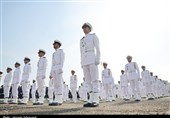ICJ Confirms Iran’s Lawsuit against US over New Sanctions
TEHRAN (Tasnim) – Iran has filed a lawsuit against the United States stating that Washington's decision in May to re-impose sanctions after pulling out of 2015 nuclear deal violates a 1955 treaty between the two countries, the International Court of Justice confirmed.
A US State Department official claimed the application was without merit and the United States would fight it in the court.
"While we cannot comment on the specifics, Iran's application is baseless and we intend to vigorously defend the United States before the ICJ," the official, who spoke on condition of anonymity, told Reuters.
President Donald Trump withdrew the United States from the nuclear between Tehran and world powers, known as the Joint Comprehensive Plan of Action (JCPOA).
The ICJ, which is based in The Hague and is also known as the World Court, is the United Nations tribunal for resolving international disputes. Iran's filing asks the ICJ to order the United States to provisionally lift its sanctions ahead of more detailed arguments.
"Iran is committed to the rule of law in the face of US contempt for diplomacy and legal obligations," Iranian Foreign Minister Mohammad Javad Zarif said in a tweet on Monday, referring to Tehran's lawsuit at the ICJ.
Iran said in its filing that Trump's move "has violated and continued to violate multiple provisions" of the Treaty of Amity, Economic Relations and Consular Rights, signed long before the 1979 Islamic Revolution that ousted the US-allied shah and triggered decades of hostile relations with Washington.
In a lawsuit filed by Iran in 2016 based on the same 1955 treaty, Washington argued that the ICJ had no jurisdiction. The court scheduled hearings in that case in October.
The next step in Iran's new lawsuit will be a hearing in which the United States is likely to contest whether it merits a provisional ruling. The court has not yet set a date.
Although the ICJ is the highest United Nations court and its decisions are binding, it has no power to enforce them, and countries - including the United States - have occasionally ignored them.






